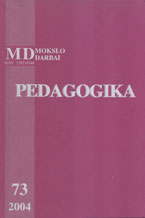Nenoro mokytis priežastys mokinių ir mokytojų požiūriu
The Reasons of Disinclination for Learning in Pupils and Teachers Opinion
Author(s): Marijona Barkauskaitė, Emilija RodzevičiūtėSubject(s): Education
Published by: Vytauto Didžiojo Universitetas
Keywords: disinclination for learning; pupils; motivation; learning.
Summary/Abstract: Learning is the essential work of a pupil. It determines the universal development of a personality, and the life long development his or her abilities. Disinclination for learning comes, when there isn't enough motivation for learning, when a pupil doesn't see any purpose or essence in his work, which is connected with a pupil's personality, values and point of view to life. The purpose of this article is to explore the reasons of disinclination for learning according to pupils and teachers opinion. The research covered 204 teachers of different subjects and 168 pupils of VII-IX classes. The facts of research suggest that the basic reasons of disinclination for learning in teachers' opinion are: "asocial family" (80,9 %), "the absence of motivation for learning" (68,8 %), "idleness" (60,1 %), "malign behavior of a pupil" (50,9%), "nonattendance of lessons" (47,4 %), "scarcity of control" (46,8 %). Pupils indicated these essential reasons of disinclination for learning: "ill success" (76,2 %), "uninspiring lessons" (66,1 %), "nobody helps me" (61,3 %), "too difficult" (57,1 %). Schoolteachers must know their pupils universally, find individual access to everybody, raise their motivation for learning, and employ new teaching/learning disciplines. Safe environment should be created, where pupils could experience positive feelings after securing the results. Schoolteachers must point out different relief centers for those pupils, whose families have difficult circs. After all, unless a pupil has minimum circs, he will not be able to concentrate his attention on learning and striving results
Journal: Pedagogika
- Issue Year: 2004
- Issue No: 73
- Page Range: 89-93
- Page Count: 5
- Language: Lithuanian

